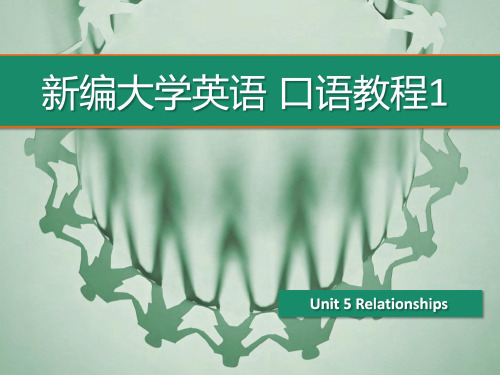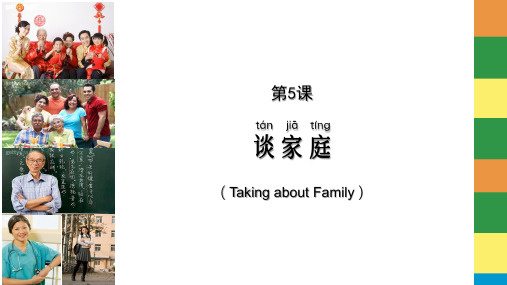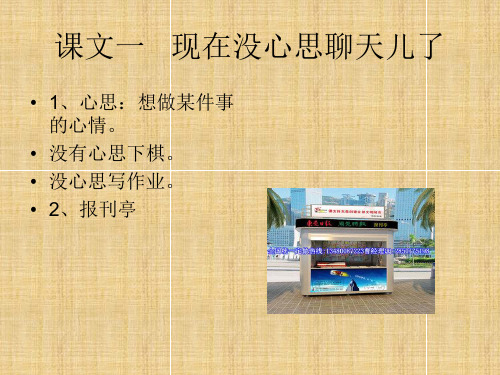基础口语第五课课件(加强完整版)
新编大学英语口语教程1教学课件Unit 5

Part 2 Read Aloud & Answer Questions
Part 3 Individual Presentation
1 Read the following presentation carefully, and pay attention to how the speaker manages to support herself with facts.
Question 2 What would you like to share with your intimate friends? And why?
Question 3
Do you think popular emojis such as and can convey more meanings than words in chatting? Why or why not?
Part 2 Read Aloud & Answer Questions
1 Go over the following passage and read it aloud. You will have 45 seconds to go over the passage and one minute to read it aloud. Pay attention to the pronunciation of each word while reading.
your presentation with facts. Facts are undoubted, proven realities that are grounded in objective evidence, such as statistics, examples, quotations, proverbs and news reports. To support and strengthen statements, facts should be directly related to them and properly cited from reliable sources. Even though a relevant, well-chosen fact functions well as a backup, try to use it in actual need. In the above presentation, to make it well-founded, after each statement, relevant facts are supplied, such as “a monitor for three years in high school”, “a basketball player”, “passed the exams of Social Etiquette and Psychology as elective courses”, and “got the National Psychological Counselor Level 3 Certificate”. All things considered, the listener will consider Hilda as the right person to be the monitor.
lesson 5基础口语课件

---------------------------------------------------------------最新资料推荐------------------------------------------------------lesson 5基础口语课件Lesson 5 Review:否定(in-,il-,dis-,non-,ir-,im-),相反(contra-,dis-,de-),一起,共同(com-,con-,co-,sym-,cor-,col-,syl-)错误(mal-,mis-,)声称(claim-) WORD STUDY ( PREFIX )半 hemi-hemisphere,semi-semisphere 单一:uni-uniform. unique mono( 单声道的 )-monotone (单调) . monochromatic(单色的) 多:multi-multitude(多数的) multiply(乘) Poly-polygon(多边形) polar(两极的)双,两:bi-bicycle,bicameral(两院制的),bilateral(两边的) twi-twins,twice 三个 tri-,trilogy, triangle(三角形)tripod(三脚架)四个 quadr-quadrangle, quadrant(象限仪) 五个penta-pentagon(五角形)Pentecost(五旬日,圣灵降临节) (A holyday that is the seventh Sunday after Easter)十: deca-, decade十年, decadence(腐烂), decadent(腐烂的) HIGH SCHOOL VOCABULARY6: 1decorate Decorate your own browser with the coloryou want. 用您喜欢的颜色装点自己的浏览器。
初级汉语口语第五课

你们在哪个教室?我们在205教室。Which classroom are you in? We’re
in room 205.
是的,我也是。/ 不,我不是, 我是法国人。
Tā shì shéi?
他是谁?
Who is this?
Tā jiào Bĭdé, (shì) Făguó rén.
他叫彼得,(是) 法国人。
Tā jiào Bĭdé, shì liúxuéshēng, Făguó rén.
他叫彼得,是留学生, 法国人。
他是谁?
Dù bu qĭ, wŏ yĕ bù rènshi tā.
对不起,我也不认识他。
I’m sorry, I don’t know him either.
Nĭ duō dà le? Nĭ jĭ suì le? Nín guì gēng?
你多大了?= 你几岁了?= 您贵庚?(It is a polite way to ask someone’s age.)
liàn xí
练 习 Exercises
二. 用正确的语调读下面的句子:Read the following sentences with correct intonation:
Zǎoshang hǎo!
1. 早上好!
Nǐ shì nǎ guó rén?
2. 你是哪国人?
Nǐ yě shì Měiguó rén ma?
我是德国/法国/芬兰/刚果/丹麦人。
Nĭ lái zì năli?
初级汉语口语第五课(课堂PPT)

丽莎:快到————了,不知道——————。
杰夫:可能————,因为——————。
彼得:那是————,现在——————吧。
丽莎:要是————,就————————了。
杰夫:没关系,咱们——开个——,也——的。
安妮:彼得,你的——不是——吗?让————
来中国————,就————了。
彼得:————了,我们俩————了。
11
提
1、提(动):提箱子
12
A是A,可是——意思是“虽然……但是……”, 重点在后者。
A:“周末咱们一起去东湖玩,好吧?” B:“好是好,可是我去不了。”
A:“这件衣服很漂亮。” B:“漂亮是漂亮,可是太贵了。”
想去是想去,可是我没时间。 麻烦是麻烦,可是我不怕。 喜欢是喜欢,可是我不能天天喝。
17
(两天以后,在路上,王平看见杰夫骑着自行车)
王平:杰夫,你的车不是丢了吗? 杰夫:没丢。那天我去商店,把车放在外边,
出来的时候,光顾和一个朋友聊天儿, 忘了把车骑回来了。 王平:你这个马大哈!
18
光顾=只顾 只专心注意……
A:“我叫你呢,你怎么不答应?” B:“真对不起。我光顾着听音乐了,没听见你叫我。” A:“这么晚了,你怎么还没睡觉?” B:“我光顾写作业,没发现已经很晚了。” “我们光顾聊天,上课时间到了,我们都不知道。
挺热闹的。 安妮:彼得,你的女朋友不是也想来中国看看
吗?让她中国过圣诞节,就更热闹了。 彼得:别提她了,我们俩已经“吹”了。 安妮:啊?抱歉,抱歉,我不知道…… 彼得:没什么,没什么。
25
吹
吹蜡烛 吹气球
他和女朋友吹了。 别提了,去北京玩的事吹了。
26
要是……,就……
人教部编版九级语文上册课件 第五口语交际

人教部编版九级语文上册课件:第五 口语交 际 人教部编版九级语文上册课件:第五 口语交 际
人教部编版九级语文上册课件:第五 口语交 际
人教部编版九级语文上册课件:第五 口语交 际 人教部编版九级语文上册课件:第五 口语交 际
人教部编版九级语文上册课件:第五 口语交 际 人教部编版九级语文上册课件:第五 口语交 际
人教部编版九级语文上册课件:第五 口语交 际 人教部编版九级语文上册课件:第五 口语交 际
人教部编版九级语文上册课件:第五 口语交 际 人教部编版九级语文上册课件:第五 口语交 际
对外汉语口语课件第5课

话题一 谈工作
生 词 总 动 员
Zuò shénme ɡōnɡzuò de? A:… + 做 什么 工作 的?
Shì B:… + 是________。
工作名称 Job Title
• 医生yīshēng (doctor) • 护士hùshi (nurse) • 职员zhíyuán (office clerk) • 经理jīnɡlǐ • 警察jǐnɡchá • 律师lǜshī • 老板lǎobǎn • 演员yǎnyuán • 歌手ɡēshǒu • 运动员yùndònɡyuán • 服务员fúwùyuán • 售货员shòuhuòyuán • 工程师ɡōnɡchénɡshī • 主妇zhǔfù
Zuò shénme ɡōnɡzuò de? A:… + 做 什么 工作 的?
Shì B:… + 是________。
话题一 谈工作
生 词 总 动 员
工作名称 Job Title
• 医生yīshēng (doctor) • 护士hùshi (nurse) • 职员zhíyuán (office clerk) • 经理jīnɡlǐ (manage) • 警察jǐnɡchá (policeman) • 律师lǜshī (lawyer) • 老板lǎobǎn (boss) • 演员yǎnyuán (actor) • 歌手ɡēshǒu (singer) • 运动员yùndònɡyuán (athlete) • 服务员fúwùyuán (waiter) • 售货员shòuhuòyuán (salesclerk) • 工程师ɡōnɡchénɡshī (engineer) • 主妇zhǔfù (housewife)
话题一 谈工作
生 词 总 动 员
初级口语I-第5课 我学习汉语

P34
国 人 ,我不学 习中 医,我学 习经 济,
也学 习汉 语。他是 我朋
友 。
Wǒ jiào Mǎdīnɡ,wǒ shì Yīnɡɡuï rãn,wǒ bù xuãxí zhōnɡyī,wǒ xuãxí jīnɡjì,yě xuãxí Hànyǔ。Tā shì wǒ pãnɡyou. 她姓 生 李,叫 李雪 。她是 中 国 人 ,也是 我朋 友 。她是 学
功能句 ɡōnɡnãnɡjù
P34
1.你叫什么名字?
我叫…… wǒjiào
2.你是哪国人?
我是日本 人/泰 国 人/美 国 人 。 Wǒ shì Rìběn rãn/Tàiɡuï rãn/Měiɡuï rãn.
功能句 ɡōnɡnãnɡjù
P34
3.他是谁?
他是 我朋 友 /同 学 /老 师 。 Tā shì wǒ pãnɡyou/tïnɡxuã/lǎoshī. 4.他也是……人吗? Tā yě shì……rãn mɑ? 他不是 日本 人 ,他是 中 国 人 。 Tā bú shì Rìběn rãn,tā shì Zhōnɡɡuï rãn.
美国
巴西 友美
我朋友
我妈妈 我爸爸
替换词语说句子
2.A:他是谁?
P35
日本人 韩国人
B:他是我朋友。
A:他也是德国人吗? B:他不是德国人,他是法国人。
加拿大人
学生 老师
意大利人
老师 医生
替换词语说句子
3.A:你学习什么?
P27
经济 法律 中医 jīnɡjì fǎlǜ zhōnɡyī
B:我学习汉语。
一、语音练习
fǎɡuï
yīshēnɡ
发展汉语口语第五课

• 19、表示不在乎 • (1)我觉得有些学生把考试当儿戏/对考试 无所谓。 • (2)无所谓/不去就不去吧,我一个人去正 好可以试试我的汉语水平。 • (3)无所谓/怎么去都行,反正不是太远。
鉴于此我们还词语练习?一1乘客游客顾客做客?2严厉?3出场?4博物馆图书馆游泳馆体育馆?5保证金押金奖金佣金严格操场体育场广场严肃严惩严打功能项目练习?16表示无奈没有办法?1不记住也得记住不记住不行啊不能不记住啊这是我的工作
课文一 现在没心思聊天儿了
• 1、心思:想做某件事 的心情。 • 没有心思下棋。 • 没心思写作业。 • 2、报刊亭
• 2(2)贵就贵点儿吧,这次不买,下次来 可能就没了。 • (3)座位靠后点儿就靠后点儿吧,总比没 有座位强。 • (4)大就大点儿吧,总比小了不能穿好。
课文三 酒后驾车是全球公敌
• 1、不言而喻:不用说就可以明白。 • 酒后开车的危险性是不言而喻的。 • 2、儿戏:小孩子做的游戏,比喻闹着玩的 或无足轻重的事情。 • 不能拿工作任务当儿戏。 • 3、鉴于:用于表示因果关系的复句中前一 句,指出后一句行为的依据,原因和理由 。
词语练习
• 一1、乘客 游客 顾客 做客 • 2、严厉 严格 严肃 严惩 严打 • 3、出场 操场 体育场 广场 • 4、博物馆 图书馆 游泳馆 体育馆 • 5、保证金 押金 奖金 佣金
功能项目练习
• 16、表示无奈、没有办法 • (1)不记住也得记住/不记住不行啊/不能 不记住啊,这是我的工作。 • (2)不努力也得努力/不努力不行啊/不能 不努力啊,竞争太激烈了。
• • • •
用以下句子说一句话 1、有这回事儿吗? 2、哪有心思聊天? 3、给您停哪儿?
想一想,说一说
• 1、今天大卫为什么很难打车? • 2、你认为政治评论员是什么意思? • 3、司机为什么说他们成了“退色的政治评 论员”? • 4、说说你对“黄金时期”的理解。 • 5、现在出租车司机为什么变了? • 6、说一说出租车司机一天的生活。
初级汉语口语_第五课

Dù bu qĭ,
wŏ yĕ bù rènshi tā.
他是谁?
对不起,我也不认识他。
I’m sorry, I don’t know him either.
Nĭ duō dà le?
Nĭ jĭ suì le?
Nín guì gēng?
你多大了?= 你几岁了?= 您贵庚?(It is a polite way to ask someone’s age.)
2. 你是哪国人?
Tā shì shéi?
3. 你也是美国人吗?
Nǐ duō dà?
4. 他是谁?
Wǒ èrshíwǔ suì, Nǐne?
5. 你多大?
Nǐ zài jǐ bān?
6. 我二十五岁,你呢?
Wǒ zài yī bān.
7. 你在几班?
8. 我在一班。
三. 替换练习。 Substitution:
C 是二十岁。
Nǐ yě shì Měiguó rén ma?
C 他是王平。
Nǐ zài jǐ bān?
3. 你也是美国人吗?
Wǒ yě.
4. 你在几班?
Sān bān.
A 我也。
Duì, wǒ shì.
A 三班。
Sān.
B 对,我是。
Yě shì.
B 三。
C 也是。
五. 说出相应的上句:Ask th Nhomakorabea questions according to the following answers:
Wǒ yě zài èr bān.
B: 我也在二班。
Wǒmen dōu zài èr bān.
A: 我们都在二班。
是的,我也是。/ 不,我不是, 我是法国人。
- 1、下载文档前请自行甄别文档内容的完整性,平台不提供额外的编辑、内容补充、找答案等附加服务。
- 2、"仅部分预览"的文档,不可在线预览部分如存在完整性等问题,可反馈申请退款(可完整预览的文档不适用该条件!)。
- 3、如文档侵犯您的权益,请联系客服反馈,我们会尽快为您处理(人工客服工作时间:9:00-18:30)。
雅思基础口语lesson 5Part 1: solutions 问题的解决办法•When asking you to express your feeling or opinion, and also your justification about an issue, the examiner may also ask you to offer possible solutions, it often begins with questions like this: •What do you think should be done?•What ought to be done if you are given the power?•How do you think this problem can be solved?•How would you go about solving this problemBrainstorming:•Talking about conditions…is serious/ crucial…has become worse•Talking about causesThe cause of … is ……contributed to/ result in …generate/ derive from•Talking about solutionsThe most effective ways of fighting …is… can be achieved /improved by …As for the best way to get rid of …The best way to overcome …主要可以从以下角度得到解决办法:•Raise people’s awareness towards this issue•Government provides fund in this field…set up more several regulations规则/条例•People from all walks of life join hands in the battle against…•Media play a leading role in ….•Scientist should work h ard in the research of…•Education of childrenExample 1: part1 – transport (以下例子来自《雅思口语真经》)1. What type of transport do you usually use?Most of the time I use my bike or go by bus. I use my bike if I’m not going too far, the weather is OK and I don’t ha ve to carry much. Otherwise, the bus is better for me.2. What do you think of the transport conditions in your hometown? They’re not too bad. There are buses going to most places and the train station provides good connections to other towns and cities. There is an airport, but it isn’t very big and doesn’t offer flights to many other places.3. How do you think the transport system in your hometown could be improved?I think that the local government could limit the number of cars in the citycenter. The re are often traffic jams and it’s very unpleasant to be on a bus in a traffic jam when the weather is very hot. The local government has also been slow to extend the bus service to new residential areas of our city. Y ou know, in China, many cities are expanding quickly. These new parts of the cities need transport links too.Extend 延伸expand 扩张Example 2: part 3 – Becoming an Adult1. At what age does the government in your country say you are an adult?At the age of 18, young people have most of the rights of adults. The big exception is the right to marry, which comes a few years later. Exception 例外2. Do you think this age is appropriate?Y es, I do. I think that laws relating to purchasing and using alcohol and cigarettes should be changed to disqualify people under 18 having easy access to them. I think that the law relating to the marriage age could be changed in the future. It was introduced mainly to help with curtailing population growth. The rate of increase in China’s population has now been drastically reduced, so the need for this law has been largely nullified.Appropriate 适当的alcohol酒精cigarette 香烟Disqualify使..丧失资格curtail 缩减/剥夺drastically 激烈地,剧烈地nullify 废弃/取消/使无效3. How can government help young people prepare for adulthood?I think that the main way is through the education system. Thegovernment could make schools teach more practical subjects and change the content of some existing subjects to include more practical elements. For example, maths classes could include lessons about mortgages and Chinese classes could include report writing. Perhaps the government could introduce a scheme to allow young people to gain work experience through apprenticeships. It might be a good idea to have trained counsellors at all schools to help students confidentially with their difficulties and worries.•Adulthood (n.) 成年•mortgages 抵押scheme 计划/方案•apprenticeships 学徒/实习生•counsellors 辅导员•Confidentially 有自信地Part 2: Questions about your future plan•Can you tell me about your plans in next one or two years?•Are you planning to study overseas somewhere?•What do you plan to do there the moment you arrive?•What will you do when you graduate / after you graduate? Answers in part 1:•I hope to go overseas next year.•I plan to study in England. / I will apply at Australia and New Zealand universities.•I hope I will get used to / adapt to the environment first.•I’m sure I will feel lonely when I first get there.•I think I will telephone my uncle who is already living there.•After I graduate, I will come back to China. / I think I will stay on and get my masters or come back to China.Useful expressions for imagining•If I could …I would …•If I had the chance to …I would …•If I were … I would …•If it were possible for me to …I ‘d•Given the chance to …I would …•If I’d …I would be …•If I had …I would have …Useful expressions for imagining•If I could …I would …•If I had the chance to …I would …•If I were … I would …•If it were possible for me to …I ‘d•Given the chance to …I would …•If I’d …I would be …•If I had …I would have …Expressing probability from 100% to 0.•Expressing probability of 100%•I’m certain I’ll get the job.•I’ll definitely come to the wedding before I leave.•Without a doubt I’ll be the top of the class.•I am sure that I will be accepted.Expressing Probability of 80-88%•There’s a good chance I’ll b e living with my friends.•Chances are I’ll be living in an apartment.•I’m almost certain I’ll find a job quickly.•I’ll almost definitely come back in no time.•In all likelihood I’ll not be coming back for three years.•I’ll very likely be late for work agai n.Expressing provability of 50-80%•I’ll probably study at a language school.•I’ll likely go on a vacation before I start looking for work.•I’ll possibly go shopping in my first week there.•I might drop off for a visit.•I may try to look for my friends in Sydney.•Perhaps I’ll study engineering.Probability 10-15%•I possibly won’t attend my graduation ceremony.•Maybe I won’t go for a driving class.•I may/ might not go to the movies much while I am there.•Perhaps I won’t cook for myself.•I probably won’t fin d a job so quickly.Probability 1-10%•There’s not much chance I will get there on time.•I doubt very much that I will get the scholarship.Probability 0%I definitely will not get my certification this year.I’m sure I won’t be able to come.七.经典英文台词《The Lion King狮子王》1. Everything you see exists together in a delicate balance.世界上所有的生命都在微妙的平衡中生存。
